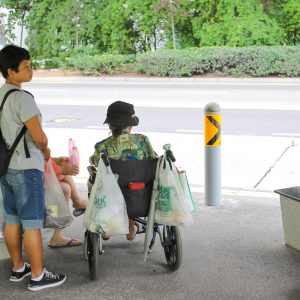The Embodied Labour of Migrant Care Workers in Singapore
December 14, 2020

Human Rights Day is observed annually on the 10th of December, in celebration of the day the United Nations General Assembly adopted the Universal Declaration of Human Rights in 1948. The Declaration proclaimed the inalienable rights that everyone is entitled to as a human being regardless of race, colour, religion, sex, language, national or social origin, or other status.
The article “Caring for the elderly: the embodied labour of migrant care workers in Singapore” (Global Networks, 2012) closely examines the transnational migration of women domestic and healthcare workers in Singapore. Associate Professor Shirlene Huang, Professor Brenda S.A. Yeoh (both NUS Department of Geography), and Professor Mika Toyota (previously NUS Department of Sociology from 2002-2012) provide insights into how eldercare labour has become stigmatised as low-status, low-paying, and dirty work deemed more suitable for the bodies of women and migrants.
The article first notes that research on transnational care work has examined both groups of migrant care workers separately, and thus attempts instead to underscore how formal and informal care are intertwined in everyday lives, especially along gender and national lines. The article goes further to explain how care is often viewed as a feminized activity that women are ‘naturally’ predisposed towards, seen as an extension of duties that women usually perform at home. It is also the dirty and intimate aspects of care however – often accorded a low socio-symbolic status and value – that employ migrant workers to undertake the ‘dirty work’. As a result, migrant workers of different nationalities are thus naturalised in different roles according to intersecting dimensions of gender, race, and class, to construct a hierarchy of carers based on stereotypes. Indeed, in both domestic and institutional spaces, the article observes how these stereotypes have created a ranking of different nationalities among healthcare employers that directly translated into a salary sale (with Filipinos who have the highest, and Indians and Sri Lankans at the bottom).
A/P Huang, Prof Yeoh, and Prof Toyota conclude by acknowledging that while meeting long-term eldercare needs with female immigrants and migrants does indeed result in greater access to needed employees, this comes at the risk of eldercare and its technical competencies (like compassion, patience, and dedication) being devalued as a profession. Their article ends with a call for societies to move away from ethnocentric typecasting tied to embodied attributes toward practices that are more respectful and that recognise the true value of care work.
Read the article here.
